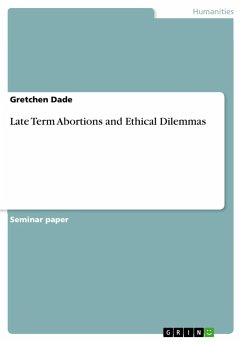Seminar paper from the year 2018 in the subject Ethics, grade: 1,0, University of Frankfurt (Main), course: Biomedical Ethics, language: English, abstract: One of the main issues that the second wave feminists addressed was the right of women to decide if and when they want to have children. Women in the sixties and seventies protested for their reproductive rights and demanded the legal access to abortion with slogans like "my body, my choice". Although many countries liberalized their laws concerning abortion, the debate about the moral permissibility still remains one of the most heated debates across different societies.Judith Jarvis Thomson's essay "A Defense of Abortion" was published in 1971 and has had a great impact on the philosophical debate on abortion and its moral permissibility. Moral philosophers who are pro- or anti-choice alike have argued about the argumentative strategy that is best to support one's claims concerning abortion. Thomson's essay has been critiqued for various different reasons and this papers goal is to work out how Thomson's position could be rethought after over forty years of its first publishing. My main thesis is virtually the same as Thomson's: abortion is not always impermissible. However, I disagree with her methodology and I argue that the details of different cases and the societal context they happen in ought to decide whether abortion is morally permissible or not. My critique is especially aimed at Thomson's strategy to assume - for the sake of the argument - that the fetus is a person, her conception of bodily autonomy and her terminology.In the first part of the paper I summarize Thomson's position while focusing on the most important aspects for the following critique. In the second part, I mainly use the theories of Gina Schouten and Rosalind Hursthouse to criticize some of Thomson's assumptions. Gina Schouten has argued (from a feminist perspective) for considering that there is a societal moral obligation for caring and protecting the most vulnerable which means that depending on the moral status of fetus', there is an obligation to care for them. Another interesting critique can be made by questioning of the role that (bodily) autonomy plays in bioethics and how Thomson uses it to justify abortion. Rosalind Hursthouse has attacked Thomson's violinist example for being too different from an actual pregnancy and found her terminology too imprecise.
Hinweis: Dieser Artikel kann nur an eine deutsche Lieferadresse ausgeliefert werden.
Hinweis: Dieser Artikel kann nur an eine deutsche Lieferadresse ausgeliefert werden.








